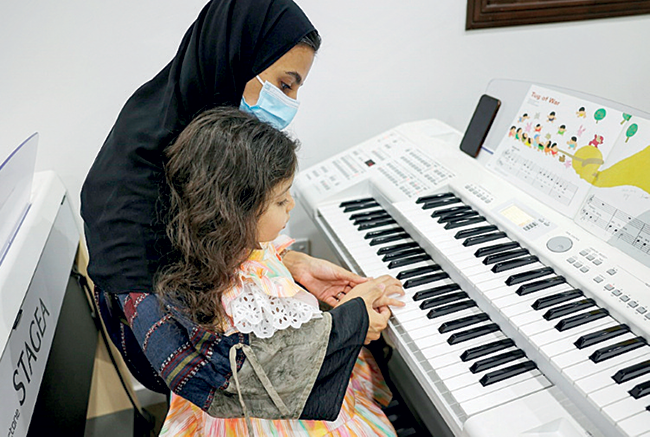News
Students embrace new rhythms at Saudi music schools

Saudi businessman Ahmed Abdullah watches intently as his seven-year-old daughter Yasmine practises keyboard scales at a Riyadh music school, an opportunity he could only dream about when he was young. Saudi Arabia’s rulers have relaxed some social restrictions after decades of adhering to a rigid interpretation of Islam, enforced by the kingdom’s religious police, that placed severe limits on social activities including group music lessons.
“Now we are thinking about the next generation and investing in it,” Abdullah said.
Previously those who could afford it hired music tutors to come to their homes, while the rest struggled to find any instruction at all. But as Crown Prince Mohammed bin Salman, the country’s de facto ruler, seeks to expand entertainment options for citizens, music has become a bigger part of daily life, and music schools are popping up in major cities.
At least five such schools have opened over the past few years in the capital Riyadh and Jeddah, the kingdom’s second city on the Red Sea coast, serving an enthusiastic clientele of children and some adults.
Yasmine’s class, at the Yamaha Music Centre, meets every Saturday for half an hour, with their Egyptian instructor running students through keyboard drills under a sign reading “Music for All”.
The session is bittersweet for her father, Abdullah, who thrills at his daughter’s enthusiasm even as it reminds him of “things I had no chance of achieving in my childhood”.
– Notes of change –
Music has been a feature of the dramatic social reforms ushered in by Prince Mohammed, who became first in line to the throne five years ago.
For decades the country was decidedly off the beaten path of most touring artists but in recent years some of the world’s biggest stars, including Justin Bieber and K-pop juggernaut BTS, have performed in the kingdom.
These marquee events have spurred allegations of complicity in a transparent bid to whitewash the kingdom’s grim human rights record.
But there is little question that many young, entertainment-starved Saudis are grateful for the shows.
Last December more than 700,000 revellers flocked to the MDLBeast Soundstorm music festival in Riyadh, officials said, for four days of performances including a set by superstar French DJ David Guetta.
Daily life, too, has become more melodious, with restaurants and cafes staging live acts or blasting recordings through speakers — some even during prayer time, when in the past they would have been forced to close. Several Saudis who are now trying to develop their own musical chops described the transformation as a boon to their mental health.
Wejdan Hajji, a 28-year-old employee at a firm selling medical supplies, said she once struggled to teach herself guitar by watching YouTube videos, lamenting that “if I made a mistake, there was no one to correct me”.
Now she pays 940 Saudi riyals (around $250) each month for classes with a Ukrainian teacher at the Yamaha Music Centre.
“I didn’t know anything, but now I’ve learned the basics,” she said.
“The one-hour session clears my mind… My personality has changed, and I’m calmer.”
– A growing market –
Such benefits could soon extend to many more young Saudis. In 2020 the kingdom established a “Music Authority” under its culture ministry which grants licenses to music schools and provides backing to young talents eager to pursue careers in the music industry. Some 100 private schools nationwide have included a music component in their curricula during the current academic year, according to an official tally.
In May, the authority launched a “Music Culture Programme” to develop the skills of public school students as well. As those initiatives get off the ground, the specialised music schools continue to do brisk business. One recent afternoon at the “House of Music” school in northern Riyadh, an instructor supervised five toddlers as they swayed to the sound of lullabies playing on a speaker.
The school opened in 2019 and has 300 students of all ages who come for lessons in rooms adorned with posters of performers like Bob Marley and Lebanese singer Fairuz.
“There is a good acceptance of the services we provide so far,” said the school’s Venezuelan director, Cesar Mora, adding that the school has a second branch in the works.
“There is a growing music-loving community and market.”
Walid Mahmoud, a 37-year-old Sudanese resident of Riyadh, began coming to the school so his young daughters could take lessons on the oud, a stringed instrument popular in the region.
Latest News
Heat index, is likely to increase up to ‘Caution level’ at some places in Eastern and North-central provinces and Mullaitivu and Vavuniya districts

Warm Weather Advisory
Issued by the Natural Hazards Early Warning Centre of the Department of Meteorology at 3.30 p.m. 27 April 2025, valid for 28 April 2025
The public are warned that the Heat index, the temperature felt on human body is likely to increase up to ‘Caution level’ at some places in Eastern and North-central provinces and Mullaitivu and Vavuniya districts.
The Heat Index Forecast is calculated by using relative humidity and maximum temperature and this is the condition that is felt on your body. This is not the forecast of maximum temperature. It is generated by the Department of Meteorology for the next day period and prepared by using global numerical weather prediction model data.

Effect of the heat index on human body is mentioned in the above table and it is prepared on the advice of the Ministry of Health and Indigenous Medical Services.
ACTION REQUIRED
Job sites: Stay hydrated and takes breaks in the shade as often as possible.
Indoors: Check up on the elderly and the sick.
Vehicles: Never leave children unattended.
Outdoors: Limit strenuous outdoor activities, find shade and stay hydrated. Dress: Wear lightweight and white or light-colored clothing.
Note:
In addition, please refer to advisories issued by the Disaster Preparedness & Response Division, Ministry of Health in this regard as well. For further clarifications please contact 011-7446491.
Latest News
People have now started to think of themselves as Sri Lankans sans ethnic or religious divisions- PM

Prime Minister Dr. Harini Amarasuriya stated that for the first time in history, mosques in Kandy had opened their doors to accommodate the needs of devotees visiting the Temple of the Sacred Tooth Relic and that people have now started to think of themselves as Sri Lankans beyond dividing into ethnicities and religions.
The Prime Minister made these remarks while addressing a public gathering held in the Paragahadeniya area in Kurunegala.
Prime Minister Dr. Harini Amarasuriya further stated:
“This country is undergoing a transformation we expected,so accordingly, we must operate in new ways. People are beginning to feel that we must work towards a new transformation. We can see this change even within our ministries. These days, sometimes when we visit ministries even after 5 PM, and ask if it is possible to have discussions, the officials are always open. Today, public officials are willing to work late into the night, until 9 or 10 PM. Officials have now started working without fear.
Remarkably, for the first time in history, Muslim mosques in Kandy remained open throughout the night to accommodate pilgrims visiting the Temple of the Sacred Tooth Relic. They even provided space for devotees to rest. There were no ethnic or religious tensions. What we saw was respect for other ethnicities and religions. This is happening because there is now a sense of a government that represents all Sri Lankan people, not just Sinhalese, Muslims, or Tamils”.
The event was attended by the candidates for the local government election including the residents of the area.
[Prime Minister’s Media Division]
News
Indian warship builder eyes 51% stake in Colombo Dockyard: FSP

The Frontline Socialist Party (FSP) has urged the NPP government to prevent Japan’s Onomichi Dockyard Company from selling its 51% ownership stake in the Colombo Dockyard Limited (CDL) to Indian government-owned Mazagon Dock Shipbuilders Limited, Mumbai, a leading shipbuilder.
FSP spokesman Pubudu Jayagoda told The Island yesterday (27) that the move seemed to be in line with the overall India-Sri Lanka understanding on the basis of the recently signed memorandum on defence cooperation.
Against the backdrop of deteriorating financial situation, the Japanese company has informed the board of directors of CDL of its plans to divest its 51 percent ownership stake in the international shipbuilding and repair company. The Japanese shipbuilder made the announcement in early Dec last year.
Alleging that an agreement has been reached on the sale of Onomichi’s controlling ownership stake to the Indian ship builder, Jayagoda questioned
the move as Mazagon primarily built a range of warships and attack submarines. Jayagoda pointed out that according to Mazagon’s profile, the Indian government-owned business undertaking was involved with European companies engaged in ship and submarine construction.
Addressing a Local Government election meeting at Weeraketiya, Pallekanda, in support of those contesting the May 6 election on the ticket of Jana Aragala Sandhanaya (JAS), the executive committee member of JAS Jayagoda emphasized that in terms of the agreement between Sri Lanka and Japan, Onomichi couldn’t sell its stake without the Sri Lankan government’s approval. Therefore, the NPP government should intervene to halt the Japanese-Indian move, the FSP spokesman said while urging the parliamentary opposition to publicly oppose the planned sale of the Japanese stake.
Among other stakeholders are Sri Lanka Insurance, Sri Lanka Ports Authority and EPF.
By Shamindra Ferdinando
-

 News6 days ago
News6 days agoOrders under the provisions of the Prevention of Corruptions Act No. 9 of 2023 for concurrence of parliament
-

 Features7 days ago
Features7 days agoRuGoesWild: Taking science into the wild — and into the hearts of Sri Lankans
-

 Business2 days ago
Business2 days agoPick My Pet wins Best Pet Boarding and Grooming Facilitator award
-

 News6 days ago
News6 days agoProf. Rambukwella passes away
-

 Opinion7 days ago
Opinion7 days agoSri Lanka’s Foreign Policy amid Geopolitical Transformations: 1990-2024 – Part IX
-

 Features2 days ago
Features2 days agoKing Donald and the executive presidency
-

 Business2 days ago
Business2 days agoACHE Honoured as best institute for American-standard education
-

 Features4 days ago
Features4 days agoThe Truth will set us free – I












